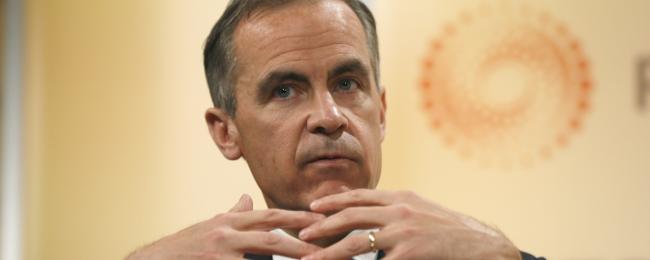Articles Menu

[This article might bring some comfort if it put a timeline on WHEN such risks could be quantified and then outlined how exactly that process would lead to creating a socially just and environmentally sane transition. Will knowing the investment risks make capitalists decide to do this? Will it create effective regulatory enforcement to compel capitalists to do this? Will it do anything at all that will begin the required transition SOON ENOUGH? This appears to be another exercise in getting people to believe that the existing system may be a bit slow, but it can and will adapt. The real choice continues to be socialism or barbarism.
-- Gene McGuckin]

Mark Carney, the former central banker whose long list of titles includes United Nations Special Envoy on Climate Action and Finance, says the world of business is going through a period of dynamic transition as it joins the battle against climate change.
Carney, who served as governor of the Bank of Canada from 2008 to 2013 before moving on to other roles, described a financial sector that has been energized by a green transformation almost invisible to most of us outside the finance industry.
While ordinary Canadians may observe a few more electric cars on the road, a few more solar panels on roofs, the finance whiz outlined at a virtual conference on Thursday a multitrillion-dollar realignment that is changing the way the world's money is invested.
Rather than being a laggard because of our commitment to oil and gas, Carney, born in Fort Smith, N.W.T., painted a picture of western innovation and financial-sector success that puts Canada in a leadership position.
In February, Carney famously described the process of stopping the rise of global temperatures as turning "an existential risk into the greatest commercial opportunity of our time."
Addressing Thursday's conference organized by the Institute for Sustainable Finance at Queen's University in Kingston, Ont., he spoke of a Canadian pension and money-management sector that punched above its weight in global influence.
"Part of the reason why the Canadian banks are profitable is because they are very good at managing risk," Carney said. "It's going to take a couple of years for everybody to be better at managing climate risk and really understanding it, but there's every reason why our banks could be some of the leaders."
When Carney was governor of the Bank of England, British Prime Minister Boris Johnson convinced him to take a key role at COP26, the UN Climate Change Conference originally scheduled for next month in Glasgow.
COVID-19 has forced a delay in the 26th world climate conference until November 2021, but a key focus of next year's gathering over which Carney will help preside remains the same: helping people with money avoid the risk as a changing climate affects the economy.
"It's going to be the suppliers of capital who will be making the decisions here," quipped Jim Leech, the chancellor of Queen's University and former head of the Ontario Teachers' Pension Plan, who moderated Carney's talk in Kingston. "It's not pulled out of the air."
But as Carney has discussed before, conventional ways of judging the future value of investments you make today just don't work if in 30 years crops fail and coastal cities begin to flood because of rising temperatures. Assets once considered to have enormous future value, such as coal deposits or pipelines, suddenly have to be reconsidered.
Industries that spew out greenhouse gases will lose value, and those that contribute to reducing global warming will be worth relatively more. Companies actively making the gradual transition from brown to green will be more valuable in any investment portfolio.
But so far, a set of standardized rules to measure those changing values remains a work in progress — although it is coming quickly. Carney said COP26 will work toward that problem by examining issues around reporting, risk, returns and mobilization.
In simplest terms, the financial industry must create conventions for how companies measure and disclose to investors their climate impact, along with a way of judging how badly failure to act will hurt an investment or portfolio, a standard way of measuring the payback from an investment in climate mitigation or adaptation and ways of redirecting capital toward lower climate damage.

One of the concepts under development is to create a percentage "warming potential" of any portfolio, just one way of taking a set of abstruse concepts of risk management and turning them into a user-friendly indicator.
Part of the pressure to make companies follow a standard set of climate accounting principles is coming from $150 trillion in global private capital that wants that risk quantified. There is social pressure, too, as citizens watch their forests burn and ice caps melt.
But Carney says that is not enough. Governments and market regulators must make climate disclosure mandatory so that investors have a transparent view of the climate value and risk of any company as it follows its business plan.
"We're not flipping a switch here," Carney said, "but we are transitioning."
Follow Don Pittis on Twitter: @don_pittis

Business columnist
Don Pittis was a forest firefighter, and a ranger in Canada's High Arctic islands. After moving into journalism, he was principal business reporter for Radio Television Hong Kong before the handover to China. He has produced and reported for the CBC in Saskatchewan and Toronto and the BBC in London. He is currently senior producer at CBC's business unit.
[Top photo: Former Bank of Canada governor Mark Carney - Peter Nicholls/Reuters https://infacts.org/was-mark-carney-wrong-dont-bank-on-it/ ]